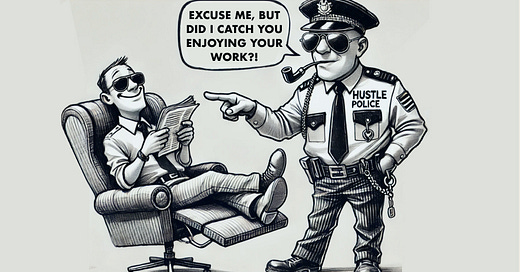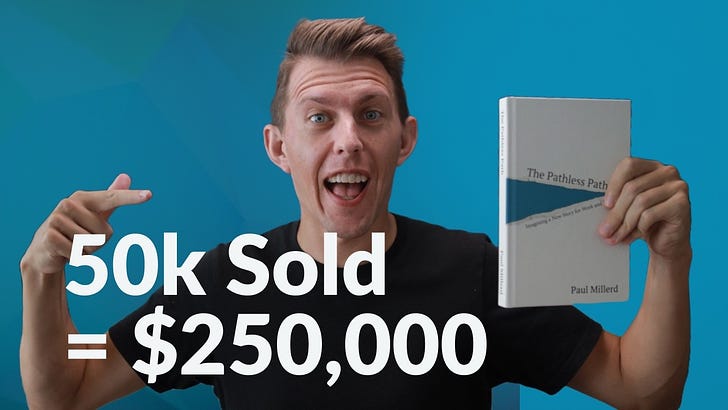English Major Dropout to "Making It" as a Freelance Writer
A Guest Essay By Jason Levin about his own "Pathless Path"
This is a guest post from Jason Levin, a freelance writer for startups and venture capital firms. Over the last year and a half, Jason built a freelance writing business on top of his writing on Twitter and his newsletter Cyber Patterns, allowing him to leave his temporary software engineering dreams behind.
I appreciate how thoughtful Jason has been in building relationships and if there is a secret he’s not really telling you in the following essay it’s that he seems to really care about people and is good at proactively reaching out, asking for help, and also contributing like he is with this guest post.
I was pretty tough on Jason with edits but I think we ended up with something that the Boundless audience will like. If you do, throw him a follow!
“Failing” On The Internet For 10+ Years
It was March 2022. I was working as a data engineer at American Express and doing freelance writing for startups I found via Twitter on the side.
I studied English at college, but dropped out the summer before senior year and did a coding bootcamp instead because I saw no path to a job above $50,000/year.
It turned out English majors could make money…if they knew where to look.
From July 2021 to March 2022, I was involved in “tech Twitter” and had a humble audience of 2,000-ish followers by writing threads about entrepreneurship and sending DMs, and hopping on the phone with anyone I thought was cool. I was also writing on my newsletter but wasn’t seeing much traction. I had less than 500 subscribers for 6+ months of work.
That was when I saw a tweet from a crypto company’s marketing manager asking for freelance writers. When she asked for my portfolio, I sent over my blog and I got my first paying gig. From there, I sent a cold DM to a founder named Greg Isenberg, showed him my past work, and talked my way into a second gig ghostwriting for him. I then shot a DM over to the pseudonymous account @BoredElonMusk with 1.5 million followers, figuring why not, maybe he’d need a writer too. That was my third gig. Thanks to cold DMs on Twitter, I was making as much money via freelance writing as I was at my data engineering job. It felt surreal. Here I was a dropout ghostwriter for founders and venture capitalists.
Since I was a kid, it was my dream to be a full-time creator and to work for myself. In the pursuit of this dream, I failed on the internet for 10+ years. I sold stickers online, started a YouTube channel, a music blog, a clothing store, a Facebook ad agency, a health-tech blog, and more projects I don’t even remember. Some were successful for a time, but all eventually failed. And so finally, after years of iterating and learning lessons, I was creating for a living. Sure, I was technically creating content for other people and brands, but I could see there was a path to becoming a full-time creator.
Do I Go All-In On Writing?
Do I go all in on writing or stay with the 9-5 and keep writing on the side? This was the dilemma I found myself in. I weighed the pros and cons. If I quit my coding job and went all in on writing, I’d have more time to focus on writing. But what if I failed? What if my newsletter never got more than 1,000 readers? Plus I was working largely with crypto companies and it’s a volatile industry. What if the market went south and my clients said “See ya later Jason, we can’t afford content writers anymore”?
I had worked my ass off learning to code and I managed to get a job without a degree but I was a sub-par engineer. People talk about 10x engineers, I was probably a .5x engineer. I caused more problems than I solved. Deep down, I knew I had no future in coding. Writing on the other hand came much easier to me than coding. I’d been doing it for years and even won a couple of competitions in high school.
I come from a family of writers so you’d think writing was a respected profession in our household, but it was quite the opposite. My aunt is a poet with half a dozen books and has been published in The New Yorker. My grandpa’s books were in Barnes & Noble. But they were both flat broke. This left my parents — and me — terrified of the same fate. For most of my life, I thought there were only two paths for a writer: fame or poverty.
With this in mind, my parents always wanted me to be practical: study business, learn to code, that kinda stuff. Like most teenagers, I didn’t listen to them and chose English as my major. When I finally ditched the English major and was making $90,000/year as a data engineer I felt comfortable. Would it really be worth risking this job to pursue freelance writing full-time? How do I break the news to my family? What would I do about health insurance? How would I pay rent?
All these thoughts were spinning around as I talked to Paul on the phone while walking my dog at the park. I had followed Paul for a while on Twitter and had just finished his book, The Pathless Path. I don’t remember exactly what his advice was or what he said, but knowing Paul, it was probably something heartfelt and wise because it certainly had an effect on me.1
Free Agency Begins
I was terrified after my call with Paul.
My heart was in my stomach. It was that terrible nervous feeling before you are about to break up with someone except that someone was my job. I knew what I had to do, but was scared. I talked to my girlfriend, my friends, and my therapist, and also did a lot of journaling. Within a week, I built up the courage to quit my coding job and go full-time freelance.
I became a free agent — for about 72 hours.
I was offered and accepted a role as a Staff Reporter at a web3 outlet called The Defiant. $80,000/year salary, benefits, great people. It was less than coding, but I’d be writing and making good money. After 72 hours, I gave up on the freelance life and accepted the position. As a Staff Reporter, I wrote stories about crypto hacks, interviewed founders and engineers, went to crypto conferences, and shared ideas on Twitter.
The funny thing about being a Staff Reporter is you have a prestigious title that sounds great to Mom and Dad, but you make significantly less money than ambitious freelance writers. I was working long stressful hours as a Staff Reporter but had friends making $200,000+ writing newsletters while traveling the world partying their asses off. I was pissed off and a tad envious.
Despite getting paid for writing I quickly remembered that leaving full-time employment was not just about becoming a writer. I was on someone else’s schedule aiming at metrics that were not mine. I realized that if I wanted to capture the upside of my skills I would need to take the risk. I sat on this for a few months, trying to muster up the courage to break the shackles and go freelance once again.
By the 6-month mark, the free-agent bug was biting at my neck again and couldn’t be swatted away. After some of my success on Twitter, founders, VCs, and marketers started sliding into my DMs to write for them too. That was stunning. Eventually, there were too many freelance opportunities coming my way to ignore. I started freelancing on the side again. Within a few weeks, I was on pace to make more than my full-time Staff Reporter salary.
Leap #2, This One Stuck
Again, I embarked on my own pathless path and left the job. I posted a tweet that I was going solo and that I was looking for introductions. I was really fortunate that all my past clients and friends commented, which gave me some social proof. From that tweet, a high-profile VC slid into my DMs along with half a dozen other companies.
Within the first 3 months of freelance, I made $90,000: the same as my data engineering annual pay. At first, I was charging per blog or per thread, but that got very tricky and time-consuming so I switched to a set amount of hours per week with defined expectations and deliverables: X amount of blogs per week or X amount of hours working on Twitter management. Through these monthly content writing and social media management contracts, I’m making $25,000/mo.
I’m a one-man content agency and while it’s fun, as anyone who writes content for others knows, it can take away from time spent on your own work. I’m still writing about content strategy for creators and brands Cyber Patterns and have reached 4,000+ readers from all over the world. While that’s 2x the size of my high school, it’s not a large enough list to make a living via subscriptions and ads. But in the next few years, I hope to use money from my freelance work to invest in myself and the business, helping find a path to making a living from my own work.
As a kid, I always dreamed of creating for a living and now I wake up every day and create cool shit with my internet friends. What changed from those failed projects? Why’d I finally succeed?
The Fog Clears
After 10+ years of failing online, I finally learned how compound growth works on the internet. Seeing this Jack Butcher design blew my mind.
It was a complete paradigm shift. I realized that I was in too much of a rush at the beginning. Every creator’s growth at first is very slow; it feels pointless for a long time. MrBeast is huge now, but it took him years of failing and looking like a fool.
I also accepted a hard truth.
For all of my failed projects, I was the reason they failed. No one else. I gave up too early and quit every time. My Mom would always tell me “You can do anything you put your mind to.” But I could never keep my mind on one thing so I never made real progress. Once I saw that Jack Butcher image, I realized all I had to do was commit to one big project for a long enough point to get past the “This is pointless” mark. If I could do that, I believed I could build something big.
So that’s exactly what I did.
In March, I promised myself I’d get 1 blog out every Sunday and that’s what I’ve done for 10+ months. Doesn’t matter if it’s Christmas, my birthday, or if I was up partying the night before. Every Sunday, Cyber Patterns now goes out to 4,000+ readers from all over the world and is now growing 30% month-to-month. During the slow months, I felt like it was pointless but I kept pushing through, knowing that long games win. I kept thinking about the projects I quit too early and promised myself I wouldn’t make the same mistake with Cyber Patterns. I cared about writing and I wanted to see it through. As my Dad likes to say about his work, “It took me 10 years to be an overnight success.”
There’s no clear-cut road and career path for a creative ADHD Twitter addict like me. Choosing a“pathless path,” where I don’t know what comes next, was the only way to turn my dreams into reality. If I chose someone else’s dreams like my Mom’s, I’d be a doctor or a rabbi. If I chose my Dad’s dreams, I’d be a lawyer. Instead, I have a Ph.D. in memes and I’m much prouder of myself than if I chose someone else’s dreams.
While at times the pathless path is foggy and confusing, I promise it’s a better happiness hack than any psychiatrist could ever recommend (and believe me, I’ve gotten every recommendation in the book). Being on the pathless path, I wake up when I want to wake up, work when I want to work, and collaborate with people I respect. I’m on the path toward growing my newsletter into something much larger and while I don’t know exactly what comes next, I know I’ll figure it out. As my Dad also says, “you’ve gotta blaze your own trail”.
Jason Levin writes a content strategy newsletter called Cyber Patterns to 4,000+ readers every week. Leveraging lessons learned from working as a content writer for startups and venture capital firms, he shares long-term content strategies for creators and brands. Sign up here.
I don’t quite remember what I said to Jason either but I do remember how fired up he was about writing. I had a sense that he was headed in that direction no matter what he would do in the short term. I’ve talked to many such people like this and it always seems obvious where they will end up but at the moment, those people still have to go through the process of leaving paths that don’t make sense.

















Try being someone who knows how to program (or code as you call it) and couldn't land a job... Even with massive university degrees with good standing. Funny enough, I found it hard to compete with the history/english majors whom did coding camps. Now, I gave up on this path to write. Hope you don't mind...haha...
Great piece, thanks for sharing this, Jason!